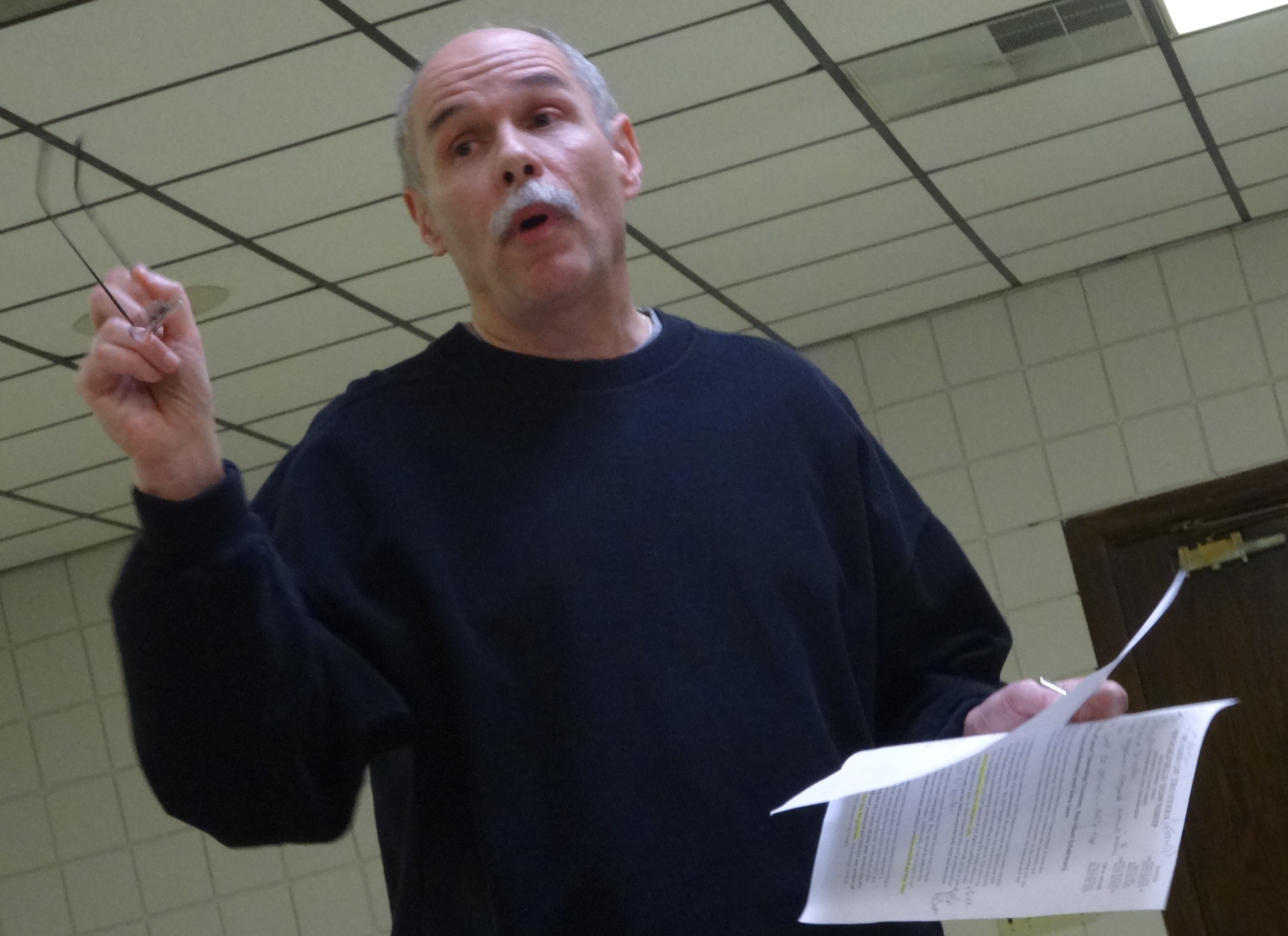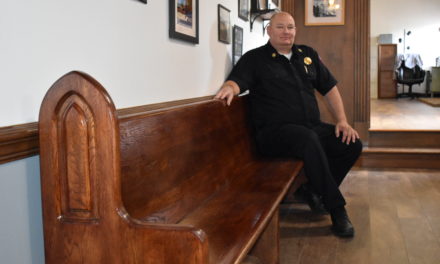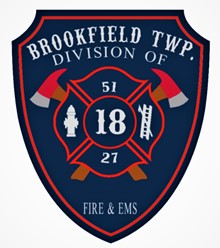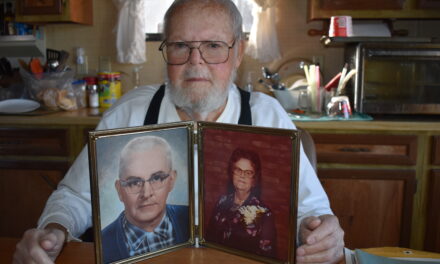The former board of Brookfield Trustees – Ron Haun, Gary Lees and Dion Magestro – sent a two-page letter to registered voters in the township at the end of the year, the first in a series of letters designed to “keep you informed of important issues facing our township.”
Unfortunately, for some residents, it led to misinformation, some questioning a core policy of the fire department, and whether the department will continue to exist at all.
The issue came to a head at the Jan. 16 trustees meeting, where a good hour was spent discussing it. There was criticism of the timing, and the fact it was only sent to registered voters.
 Resident Jeff Younkins, who is a full-time firefighter for the city of Warren, alternately called the letter misleading, biased, propaganda and “full of half-truths and nontruths.”
Resident Jeff Younkins, who is a full-time firefighter for the city of Warren, alternately called the letter misleading, biased, propaganda and “full of half-truths and nontruths.”
Raella Baker, president of the Brookfield Township Volunteer Firemen’s Auxiliary and daughter of former Assistant Fire Chief Hays Montgomery, said the missive was “evasive.”
Haun, now joined on the board by Lees and Dan Suttles, said people are reading things into the letter.
“I’ve also seen some things on Facebook that people are making the insinuations that we’re trying to get rid of the (emergency medical service), and turn our fire department into a volunteer” fire department, Haun said.
“That’s what it sounds like,” Baker said.
“We stated twice in the letter that we weren’t looking to get rid of any of these services,” Haun said. “What we wanted you to be was an informed resident.”
Baker informed the trustees that she credits the department with saving her life when she had a medical emergency.
“Our guys try hard and they’re always there for our residents,” she said. “My main concern is I didn’t want to go back 50 years, when my father was a volunteer firefighter. We have the best fire department around us, as far as I’m concerned, and I thank them publicly for saving my life.”
Haun noted the letter touts the department’s professionalism and quality.
“Don’t read into things,” Haun said. “That’s all I ask of people. Just look at the facts.”
That led to a lengthy discussion of the facts. Younkins asserted the letter gets many facts wrong, some of which are addressed elsewhere in this edition of NEWS On the Green.
The crux of the trustees’ concerns are the department’s finances and administration, Haun said.
Money is “what this is all about,” Haun said.
Whenever the trustees ask about something that concerns the fire department, they are always told, “it’s being handled,” Haun said, and specific information is hard to come by.
“For a good number of years, the administrative side of our fire department has fallen very short,” Haun said. “Very short. Apparently, the trustees have been kept in the dark about a lot of things down there.”
The trustees were not aware that there have been bills to nonresident patients that have not been paid. Yet, the fire department continually comes to the township to make up shortfalls out of the general fund, Lees said, even at a time when ambulance usage and income is increasing.
“Everybody up here is aware that we had some issues with ambulances that went entirely too long, to replace vehicles,” said Interim Fire Chief Dave Coffy. “We had a really high maintenance bill. That’s done. We got two new (ambulances), now. We also had some loans that are now paid off, so that’s going to help us out.”
Coffy said there should be a fire-year budget forecast to plan for equipment purchases and other major expenses. He also said the fire department is not getting credit for the grants it has secured over the years from the Federal Emergency Management Agency, which has netted the township hundreds of thousands of dollars – for local matches that are pennies on the dollar – for a fire truck, air bottles, turnout gear and other equipment.
Supplementing the fire service from the general fund “is not unusual in the least,” Younkins said. “Most departments, most township fire departments, use the general fund as a backup.”
It’s needs to become unusual in Brookfield, Haun said.
“We need to look at things financially and try to do better with our money that the taxpayers are giving us right now, before we go to the voters and say, ‘Give me some more,’” Haun said.
The department ended 2017 with $37,000 to carry over into the new year.
While Younkins criticized the trustees’ statement that they do not want to place a fire levy on the ballot, there was no argument that the department should be made better.
 “No one is against making it better,” said Fire Capt. Matt Gordon. “We want to make it better, but there’s a good way to go about this. Your letter’s not well-written. The facts are a little bit skewed. I choose to believe it’s not intentional. We came here to educate and inform, we didn’t come here to argue. We felt like you had bad information. I think we’ve shown that, maybe, you do have some bad information.”
“No one is against making it better,” said Fire Capt. Matt Gordon. “We want to make it better, but there’s a good way to go about this. Your letter’s not well-written. The facts are a little bit skewed. I choose to believe it’s not intentional. We came here to educate and inform, we didn’t come here to argue. We felt like you had bad information. I think we’ve shown that, maybe, you do have some bad information.”
“That letter is extremely too soon,” said former Trustee John Miller. “It should not have been sent out to the public until you people and these people sat down and discussed what your problems were, discussed what you’re going to do in the letter. You just accused these guys of never coming to you and telling you anything about gear going out of date. You’ve never gone to them, either, and said, let’s sit down, let’s discuss this stuff.”
THE ISSUES IN CONTENTION
Issue 1: “Residents are under the assumption that the ambulance services provided are free. They are not free.”
The township’s billing policy is to accept what a Brookfield Township resident’s insurance company will pay for a medical call.
“Based on your policy, your residents don’t ever see a bill,” said Heath Smedley, account manager for Medicount Management, Cincinnati, which handles billing for the township. “It just goes to their insurance, if they have insurance. If they do not have insurance, it goes into the write-off category.”
If the patient is a non-resident, they will be billed for what insurance does not cover.
Township residents are not billed because they support the service through property taxes.
“We don’t want to bill our residents,” said Interim Fire Chief Dave Coffy.
The problem with the statement in the letter is that residents now believe that they will be billed for an ambulance call, fire department supporters said.
“The overwhelming sense coming from the community, and I’m talking in people’s living rooms and stuff like that, is that people are asking us, ‘Man, how much is this going to cost me?’” said Fire Capt. Matt Gordon. “I don’t want anybody to delay calling for an ambulance because they’re worried about an out-of-pocket cost. That’s what’s happening here.”
Trustees Ron Haun and Gary Lees stuck with their contention that the medical service is not free. “But, their insurance does cover the expense,” Haun said. “Well, insurance isn’t free.”
Issue 2: “Our firefighters and EMT personnel are highly qualified and make use of their training on an average of 3 to 4 times a day for ambulance calls.”
“You left the fire part out of it,” said resident Jeff Younkins, referring to the exclusion of fire, motor vehicle crashes, storm damage and other calls.
“We got 1,999 calls, by the department’s public document,” Younkins said. “Divide that by 365. It’s not three or four, it’s 5.5. Extremely misleading. It says ambulance, and I understand that, (Trustee) Ron (Haun), but you left out the rest of it. The reason ambulance and fire go together, nationally, is because it’s the most cost-effective way to provide fire and ambulance service in the United States.”
Haun said the trustees got their numbers ”from the reports from the billing company. We didn’t ask about the fire calls,” Haun said.
Issue 3: “This responsibility of this collection is the duty of our full-time fire personnel.”
“That is the most outrageous thing in the whole letter,” said township resident Jeff Younkins.
This statement was made in the letter after talk of uncollected and written-off balances: $47,331 in write-off debt and $25,675 uncollected for the first half of 2017, and $150,974 written off and $37,000 uncollected in 2016.
For 2017, there was $191,000 in write offs, said Heath Smedley, account executive for Medicount Management, Cincinnati, which bills for the township.
“The bulk of that was residents, so you can’t do anything with it, based on your policy,” Smedley said. “That goes away.”
The policy is to accept whatever a resident’s insurance company will pay and not to bill residents. Nonresidents are billed the balance after the insurance company pays its share.
“Maybe” 20 percent of the write-off debt was non-residents in 2017, Smedley said.
“It was brought to my attention that they (firefighters) are in charge of the billing,” said Trustee Ron Haun.
“You’re misinformed if you think that we’re in control of the billing,” said Fire Capt. Matt Gordon. “What I do is, I get all my run sheets, I check them for accuracy against our medical protocols and against everything else and I make sure that the billing, that the information, is on that paper, or that is on that electronic chart, and then I send it off to Medicount billing, and he (Smedley) takes care of it. I am responsible to get that billing to the billing company, but … I’ve never had any tools and anything like that to go and collect money. I’m not so sure that’s my role here.”
The question was raised of who goes after uncollected debt from non-residents. Currently, nobody does.
Police Chief Dan Faustino, the appointed fire department financial administrator, said he brought the uncollected debt to the trustees’ attention because he wants to ensure “we’re not leaving money out there.”
Smedley, whose firm is paid 7 percent of what it collects, said the township could go after that debt, but officials have to decide whether it would be worth the effort. Township employees could go after it – Faustino said he wants to research whether there is enough expertise in-house; a collection agency could be hired at a rate of 25- to 30-percent of what is collected; or the Ohio Attorney General’s Office can be asked to do it at a rate of about 15 percent.
“Of that, you could expect, maybe, 7 percent on a good year,” Smedley said of how much could be collected, but later said the collection could go as high as 10 percent. “Maybe a little higher if you’re using the attorney general.
Despite Smedley’s discouragement, there was support to try to collect unpaid bails.
“I think that the fiscal officer and you should all go after it,” Gordon said.









